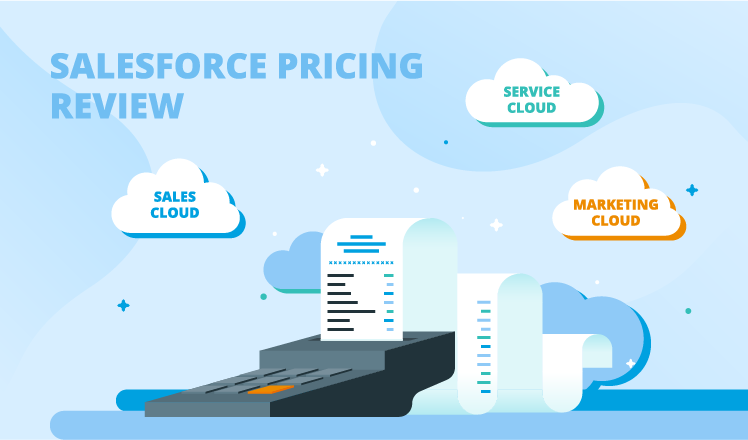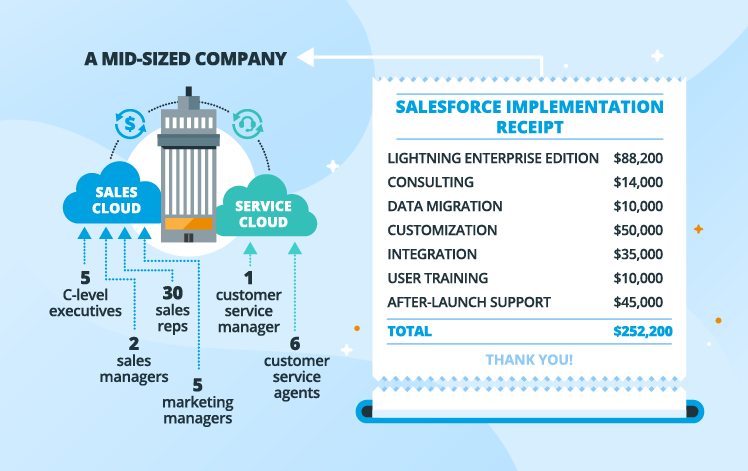What’s the Cost of Salesforce Products and Implementation Services? We Know the Answer
Editor's note: A CRM implementation company with 15 years of experience in the field, ScienceSoft talks about Salesforce pricing range based on the knowledge from our projects.
If you consider Salesforce as an option to transform or set to rights your sales, marketing or customer service efforts, the total cost of the solution will be one of the factors determining your choice. Salesforce implementation costs can be anywhere from $10,000 to well over $50,000 where the cheaper version is close to OOTB and the more expensive one is a highly customized solution. To make an accurate estimation, you’ll have to dive deep into the Salesforce pricing and calculate how much you’ll spend on purchasing, deploying, tailoring and further maintaining your solution. Our Salesforce implementation specialists are ready to assist you with this task and provide a ballpark estimation of the total Salesforce cost, including products and implementation services.

The Salesforce pricing model, its benefits and constraints
The Salesforce pricing model seems rather transparent. Your annual payment depends on the number of Salesforce users in the organization and the price of the edition of Salesforce products with a certain range of capabilities available out-of-the-box.
However, certain constraints, like the limited number of users in the Essentials edition, are present too. Imagine a small company with a sales team of 10 sales reps and a manager that needs the most basic functionality available in Salesforce to cover their sales needs. Salesforce Essentials, the initial edition of Sales and Service Clouds, could be an option for them, be it not for the number of users the edition provides (up to 10 users for Sales and Service Clouds). Naturally, Essentials is not an option and the company will have to buy Lightning Professional edition instead, which would suffice in terms of the number of users, but would cost 3 times as much as Essentials.
Another constraint is the availability of certain features for additional price only. This reveals the problem of the so-called “hidden costs”, which means you’re unlikely to do with an out-of-the-box solution, regardless of the edition you’ll choose (even the ultimate one, called Unlimited, has a number of paid add-ons). Certain features require additional investments, and you’ll have to accept that, if you wish to maximize the efficiency of your Salesforce CRM.
Salesforce pricing for core products and their editions
The list of key Salesforce products, or Clouds, used to address sales, customer service and marketing needs includes:
- Sales Cloud – a solution for sales automation, sales process design, reporting and forecasting.
- Service Cloud – a solution for omni-channel customer service.
- Marketing Cloud – a solution for digital advertising, email, web and social media marketing.
These are primary Salesforce products, which can be later complemented with additional functionality, like Salesforce CPQ & Billing (a solution for managing quotes, orders, and invoices), Pardot (a suite of tools for B2B marketing automation) or third-party applications placed on AppExchange. Since the number of Salesforce add-ons is highly dependent on a company’s specific goals (and that’s why their overall cost is hard to predict), we’ll consider the Salesforce pricing options for key products only.
Sales Cloud pricing
Salesforce currently offers 4 Sales Cloud editions that differ in functionality and cost:
| Lightning Essentials ($25 per user/month billed annually) is suitable for companies with the need for basic CRM functionality (like lead, account, contact, opportunity and sales tasks management). |
| Lightning Professional ($75 per user/month billed annually) suits mid-sized businesses with one sales department. |
| Lightning Enterprise ($150 per user/month billed annually) will be a good choice for mid-sized and large businesses with multiple sales teams in need for numerous automated sales-related processes and advanced sales reporting and forecasting. |
| Lightning Unlimited ($300 per user/month billed annually) is the most feature-rich edition that provides huge opportunities for sales automation and unlimited access to 24/7 toll-free support. |
Read also:
- Sales Cloud Edition Comparison: Differences, Limitations and Pricing
- Salesforce Sales Cloud Review: Top Pros and Cons
Service Cloud pricing
Just like in Sales Cloud, there are 4 editions available in Service Cloud:
| Lightning Essentials ($25 per user/month billed annually) provides the most basic customer service features, like omni-channel case routing, case escalation rules, web and email case capture for up to 10 users. |
| Lightning Professional ($75 per user/month billed annually) provides a more extended functionality with features like the case milestone tracker, computer telephony integration and order management to any number of users. |
| Lightning Enterprise ($150 per user/month billed annually) with comprehensive functionality including service process automation, field service and advanced reporting with slight limitations. |
| Lightning Unlimited ($300 per user/month billed annually) provides the richest functionality for customer service needs with access to 24/7 toll-free support, configuration services, and unlimited user training opportunities. |
Read also:
- Sales Cloud vs. Service Cloud – Choose Your Salesforce Tool
- Customer service management dressed in Salesforce Service Cloud: Looking good
Sales + Service Cloud pricing
If you need to provide sales reps and customer service agents with access to both Clouds, you may choose any of the 4 editions that combine Sales and Service Clouds’ functionalities, such as:
| Lightning Essentials ($25 per user/month billed annually) with basic features for sales and customer service, suitable for small teams of no more than 10 people in total. |
| Lightning Professional ($100 per user/month billed annually) with substantial functionality for sales and customer service activities for any number of users. |
| Lightning Enterprise ($175 per user/month billed annually) is a highly customizable edition for covering comprehensive sales and customer service needs typical of a midsized or large organization. |
| Lightning Unlimited ($325 per user/month billed annually) provides ultimate functionality for sales and customer service along with unlimited support capabilities and access to premier Salesforce resources (Premier Toolkit, training templates, user adoption programs and more). |
Purchasing the unified product is slightly more expensive than providing sales reps and service agents with separate solutions for sales and customer service. Since sales reps and service agents need separate user licenses, a company that opts for the Sales+Service option is going to pay $25 more for each user license, than in case of separate Sales/Service Clouds licenses (for the Professional edition and higher). However, this option may be suitable for the companies where sharing customers’ data between sales and customer service teams is crucial for the consistency of business operations.
Marketing Cloud pricing
Marketing Cloud’s functionality is divided into suites aimed to serve different marketing goals like email marketing, social media marketing, advertising or B2B marketing automation. It’s required to purchase a yearly subscription to start using the suites you opt for:
| Suite 1 for Email, Mobile, and Web Marketing (the price depends on the contact and message volume) is aimed to support your email marketing campaigns and build personalized mobile and web customer journeys. |
| Suite 2 for Social Media Marketing (from $1,000 per month for the basic edition to $40,000 per month for the most advanced one) is used for improving content marketing and customer engagement in social media. |
| Suite 3 for Advertising (the price depends on the number of advertising audiences and contacts) is used for targeted advertising, customer segmentation and using customer data to create and manage powerful one-to-one advertising campaigns. |
| Suite 4 for B2B Marketing Automation (from $1,250 per month for its basic edition to $4,000 per month for the most advanced one) is a toolkit, which allows automating lead generation, tracking and nurturing. |
Salesforce implementation services and their cost
Now that you’re familiar with the costs of Salesforce products, let’s consider a live example to see what other “building blocks” your implementation expenses will be made of.
Let’s consider a mid-sized company. The company plans to implement Salesforce for managing their sales and customer service processes, and provide user licenses for:
- 5 C-level executives (Sales Cloud subscription).
- 2 sales managers (Sales Cloud subscription).
- 30 sales reps (Sales Cloud subscription).
- 1 customer service manager (Service Cloud subscription).
- 6 customer service agents (Service Cloud subscription).
- 5 marketing managers (Sales Cloud subscription to support their marketing activities with the info on the state of sales).
Considering the pricing of Sales and Service Cloud editions, which fits the company’s scale and the needed level of sales and customer service processes automation, the company’s total annual fee to Salesforce may be:
- $88,200 for the Lightning Enterprise edition.
- $176,400 for the Lightning Unlimited edition.
To get the idea of all the implementation expenses, it’s necessary to take into account the cost of implementation services. To calculate the approximate costs for the company from our example, we’ve taken the average hourly rates of Salesforce consultants, developers and support specialists, the amount of time required to perform the implementation activities and their complexity.
Consulting
The costs of consulting depend on who to turn to for the service. The hourly rates of freelance consultants are tangibly lower than those of Salesforce consulting partners (and the quality of consulting differs accordingly, too). Taking the latter’s average hourly rates, we see that the approximate cost of a two-week consulting for the company from our example may reach $14,000.
Data migration (for users with a legacy CRM)
In case you’re using a CRM already but planning a switch to Salesforce, you’ll need data migration services. Data migration is rather a costly affair since it implies a number of activities prior to the data import itself. It is necessary to check the data’s accuracy first, clean it from duplicates and errors and map the data to the corresponding Salesforce fields. Migration can also entail building custom tools to make the automated data transfer according to a pre-set schedule possible. All these efforts are estimated $10,000 on average to address the possible needs of the company from the example.
Customization
The cost of customization will depend on the complexity of the company’s internal processes and the corresponding technical means used for tailoring the solution. Modifications with point-and-click tools, like default reports/dashboards or user profiles and permission sets are significantly cheaper than the changes introduced with code (like code-based workflows or custom tax calculation processes). Most probably, the company from our example will need both configuration and code-based customization, like creating custom objects and fields, lead scoring and distribution rules, a custom discount approval process, quote and order management. The approximate cost of customization in this case is estimated to be around $50,000.
Integration with third-party systems
The cost of integration depends on the number of external systems to connect a Salesforce solution with, the complexity of custom development performed for that, and the depth of changes to the Salesforce user interface. The company from the example needs to integrate its Salesforce solution with a SharePoint-based document management system, Outlook and the company’s website. The integration with Outlook will be performed with standard Salesforce connectors (APIs, OAuth 2.0), and the 2 remaining integrations will require custom development in addition. To meet these integration needs, the company may need an investment of $35,000 on average.
User training
User training costs depend on the training form (a self-learning or an instructor-led training), number of users, their type (end users or technical users, like Salesforce admins), and the hourly rate of a training provider. The company like the one described needs preparing an in-house admin as well as seeing to the learning needs of various specialists in sales, marketing, and customer service. So, their training budget can be rather impressive and is estimated at around $10,000.
After-launch support
The cost of after-launch support is determined by the length of the service and the hourly rate of a support provider. On average, support lasts 3 months after the solution’s deployment. Taking the average hourly rates of support providers into account, we may estimate the costs of 3-month support for the company from our example at around $45,000.
The total cost of Salesforce
Summing up all the annual expenses on the products and implementation services, we get the total Salesforce implementation cost of $252,200 for the midsized company from our example.

However, the cost of customization, data migration and integration may differ greatly from the approximate figures we provided, depending on the certain company’s needs, the scope and complexity of custom-built functionality, the number of integrations and the amount of data to migrate to CRM. Another important thing to mention is that this sum, including the cost of products and services, is paid only once, when Salesforce is implemented. Next year the Salesforce spending of the company from the example would consist of the products’ costs only, and be either $88,200 or $176,400, depending on which Salesforce edition they’ll choose.
The bottom line
With rough estimates of the Salesforce implementation services and product costs in this article, you can get the general idea of the implementation budget. Nevertheless, your real implementation expenses will be determined by your business goals and problems to address. To get a more accurate estimation based on your project’s specifics, you can contact our Salesforce team.

